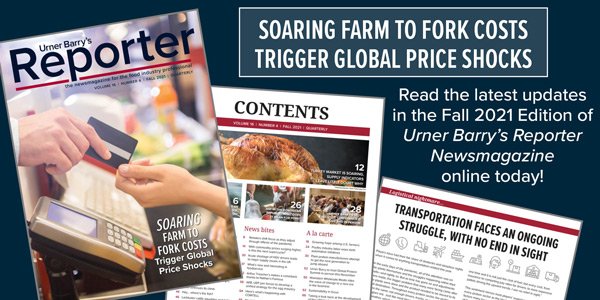REPORTER: ASF in the Dominican Republic: What Does it Mean for Pork?
Monday, 04 October 2021October 4, 2021
 This article was originally featured in the Fall 2021 Edition of Urner Barry's Reporter magazine.
This article was originally featured in the Fall 2021 Edition of Urner Barry's Reporter magazine.
On July 29th, the USDA confirmed that African Swine Fever was discovered in samples from pigs in the Dominican Republic. Since the outbreak that began in China during the summer of 2018, this is the first set of cases that have hit the western hemisphere and the closest the virus has been to the United States. The initial reaction to this news was fear, and hog futures tumbled as a result. In this article we’ll lay out what we know and what we don’t know about this current situation and what kind of impact it may have on the U.S. pork market.
First, as a reminder, ASF is devastating to a hog population as it is both easily transmittable and highly lethal to hogs–it does not, however, affect humans. China incurred massive losses to their herd from 2018 onward, and the virus quickly spread to surrounding Asian countries in addition to significant outbreaks across Eastern Europe and Africa.
For a country, African Swine Fever poses two considerable risks: If left uncontained, the virus can lead to substantial losses in hog supplies, thus tightening pork production and leaving the host country having to cope with high prices and being forced to source supplies from abroad. This is essentially what happened in countries such as China, Vietnam, and the Philippines, among others. The other risk factor is that trade partners will often ban imports from the infected country, both due to the risk of infected product spreading the virus to the recipient country, and because it can be an optics issue if they are importing “infected meat” from a country with the virus–Germany is the most recent country dealing with this angle of the risk.
In the situation with the Dominican Republic, it is more of a concern to the U.S. pork market due to the country’s proximity to the United States and one of its territories, Puerto Rico, than the risk of significant Dominican hog losses. Less than 700 miles separate the southern-most point of Florida from the north-western most point in the Dominican Republic and Puerto Rico is less than 80 miles from the eastern most point of the country.
If a case were to occur in the United States, it is unclear what actions our trade partners would take, but the likelihood of it causing significant monetary losses is high. Banning all exports from the U.S. may not be viable for some, as they are highly reliant on our pork supplies, and thus more targeted bans could be on the table.
The distance from Puerto Rico is troubling because there is a chance that a country such as China, which has a track record of using shaky-at-best reasoning to impose significant penalties to the U.S. and Canada, could use an infection within a U.S. territory to ban or in some way restrict imports from the entire United States. This is merely just a thought experiment, but we have seen irrational moves and politicallycharged posturing in the international trade community in the past.
What we also don’t know at the time of writing this piece is how ASF ended up in a country surrounded by water and a significant distance from the next country with an outbreak. The Dominican Republic, home to Punta Cana and a number of other Caribbean getaways is a tourist hotspot, bringing in travelers from around the world. While we may never learn of the specific event or individual that brought the virus, testing is likely already underway to identify the region where the virus originated.
What this news ultimately did was reinforce the idea that we, as an international pork market, are not out of the woods yet when it comes to African Swine Fever. The virus poses a significant threat to the industry and the spread is clearly not as contained as we need it to be. Bio-security measures are more important than ever and there should be an even greater emphasis on developing an effective vaccine in order to prevent significant monetary and hog losses.
Russell Barton
Urner Barry
1-732-240-5330
rbarton@urnerbarry.com
